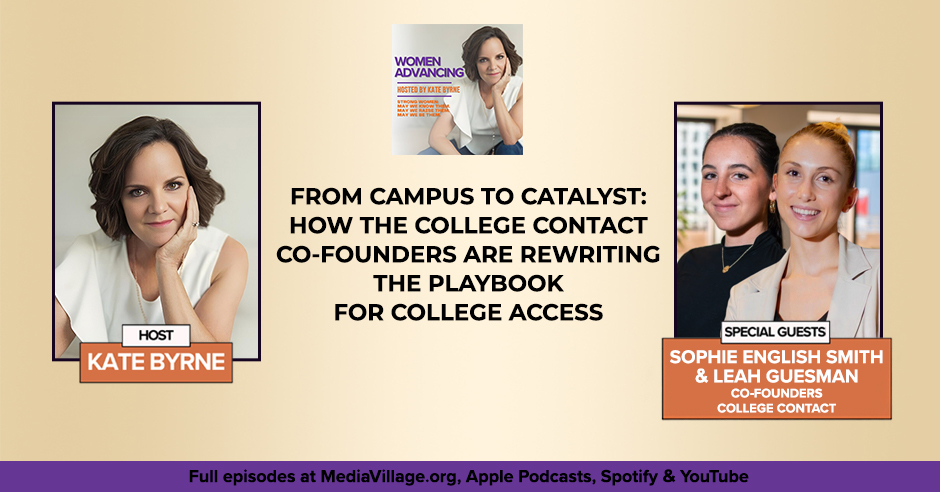
College admissions are often mired with controversy and difficulties, making the process extremely complicated and unfair. In this age where college access is becoming more stressful than ever before, two amazing women are leading the charge to make this process more humane and even data-smart. In another episode of the Founder Series, Kate Byrne sits down with Sophie English Smith and Leah Guesman of College Contact, a nationally recognized EdTech platform transforming college and career advising. Together, they share their experiences in running a business, emphasizing the importance of embracing humility, being comfortable with discomfort, and planning months ahead with the worst-case scenarios in mind.
—
Watch the episode here
Listen to the podcast here
From Campus To Catalyst: How College Contact Co-Founders Sophie English Smith And Leah Guesman Are Rewriting The Playbook For College Access
Founder Series: Real Talk About Taking An Idea From Seed To Full Bloom
What happens when two powerhouse young women take on one of the biggest stressors in a student’s life? That would be college admissions. They decide to make it radically more human, accessible, and even data-smart. They go on to win awards and big ones, and they shake up an entire industry. They go on to build something that works for real people. They build wealth across many generations, and they shift the trajectory of communities at large.
I’m thrilled to be joined by Sophie English-Smith and Leah Guesman, who are the co-founders of College Contact, which just took home the 2025 South by Southwest EDU EdTech Award, which is no small fee considering the company they were in. Their platform is all about bringing transparency and connection back into the college admissions process and matching students with real college experience, not just glossy brochures, but also making sure that they have a peer to whom they can work with who understands what they’re going through.
We’re going to talk about what it takes to innovate in a deeply entrenched system. We’re going to talk about what they’ve learned about running a company, about Gen Z, about the importance of understanding financials, of being scrappy, and so much more. We’re going to also learn what’s next for this rocket ship of a company. Join me. Listen in and stay to the end because as always, I share my KB takeaways. Let’s hear.
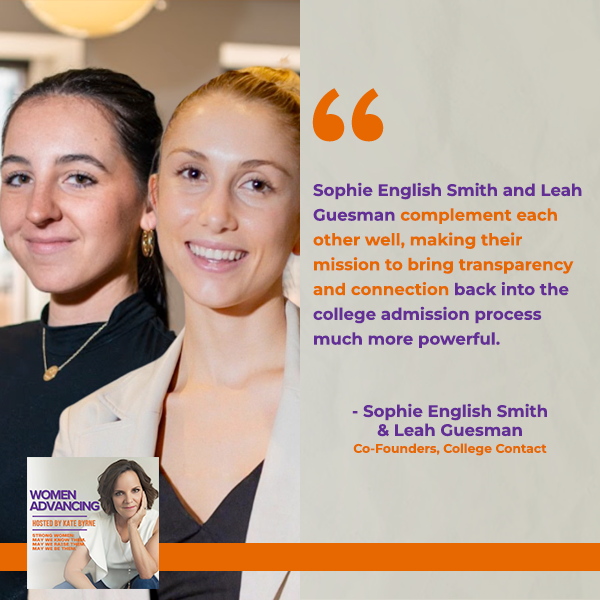
Welcome to the show. We are so fortunate to have two of my favorite female founders on the planet. I am now devoting at least one, if not two, episodes a month to female founders. We are so fortunate to have the founders of College Contact. We’ve got Sophie English-Smith, who’s the CEO and, of course, co-founder, and partner Leah Guesman, who is the COO. Welcome, you two. It’s great to see your smiling faces.
Thank you for having us, Kate. We’re thrilled to be here.
What the world doesn’t know, but I do, is that both Sophie and Leah have just returned from South by Southwest, where they won the Education 2025 EdTech product of the year. Ladies, congratulations.
Thank you.
Thank you. We’re thrilled. It’s so exciting.
The Real Story Behind the Launch
I want to get into that a little bit later, but for now, I want to start at the beginning. I just finished doing moderating a panel over at the at Darden’s Graduate Women in Business. I did it along the lines of a day in the life of an idea. Many people have ideas, but so few people get it up and into the realms of action. What sparked your idea in the first place? What gave you that push to go?
Our company has an interesting founding story. We were founded from an accident in my dorm room at UVA. We had a TikTok video go viral where I was talking about getting into UVA and how UVA was my dream school. Interestingly, the next day, we had a wait list of 5,000 students reach out for help. I was nineteen at the time, so that was a pretty shocking moment to see 5,000 16 through 18-year-olds asking a 19-year-old for help.
What was compelling was that 93% of them wanted to pay us again as nineteen-year-olds for help. I knew I couldn’t do it alone. I started calling some college friends, started recruiting them and saying, “Let’s work together. Let’s band together and let’s start helping some of these students.” There’s a problem here. If 5,000 students that found me from one TikTok video are willing to pay me to help them get into their dream school.
Leah was one of the first people I called. I brought her on board, and over our time period of being undergraduates at UVA, we had helped close to 3,000 families navigate pathway planning. To answer your question about how we started it, I think it was just a desire in my heart that this is wild. It is wild that this many students need help. There was no way in my head that I could just let that waitlist sit there. Even though I had no idea how to start, how to advise students on college applications, I knew what I did know, and what I did know was that I was a pretty strong writer.
My first step was maybe I can read some of their essays and help them with that. We started with essay work. As we kept going forward into our later years, we advanced that and learned the college application season, application strategy, building college lists, and how to help students navigate major selection and career pathways. We expanded from there, but we started small. There was no tech, Venmo, phone calls to parents, or phone calls or texts to kids.
Give the quick 30-second pitch of what College Contact is in the first place.
Having deep care and respect for one another is the relationship co-founders should have. Share on XCollege Contact is a near-peer advising platform. We help individual high schoolers and families, and then high schools in the K-12 space navigate career and college planning. We go in and help counselors. We provide this army of vetted and certified undergraduates to come in and support their caseloads. We also work directly with families that are struggling with what are my students’ next steps. How can we help them get there? How do we make this relatable to their situation and personalized to the family’s needs?
Growing The Business Beyond College
That’s helpful. What do you wish you’d known before launching? What’s something no one told you?
Do you want a good answer?
I like them both. I want a true answer. I want to both and answer.
I think the biggest thing that Leah and I talk about a lot is, honestly, I had no idea when we first started that this is where we would be. I did not see in the early days, College Contact being something that I would take full-time. I was still recruiting for banking and finance jobs. I got my dream job. Leah got her dream job at BCB. We did not think that this was going to be something we were going to take beyond college.
We saw it as a side business. I think that has a lot to do with how I saw startups and startup culture. How I understood startup culture and tech was that it had to be some sexy, innovative thing. To me, college advising, using college students with no tech, was not something that I saw as being a big company. Through college, I felt like that limited our ability to grow because I wasn’t thinking big. I was thinking, “Let’s just help the next student recruit the next college student to help us.”
I talk about this a lot with the students we mentor now because when they come to me and they’re like, “I don’t know if this is a good idea, but I have a lot of traction. I have a lot of organic traction.” I tell them some of the best businesses built in the world are the ones that aren’t the new ChatGPT of the world. Lower confidence levels have now skyrocketed, obviously, because I’ve learned a lot more about EdTech, about I’m working with students to impact the need in schools for what we’re doing.
I couldn’t be more excited about the vision of what we’re building. Now, I do see it as a potential IPO company. I credit it to you and a lot of the people we met at UVA. When we went through those early pitch competitions, you guys validated it for us. We just blindly applied. Here we are. We’ve helped all these kids, and to see so many people in the industry come together and be like, “This is incredible that you’ve had this much traction this early on.” That’s a signal, and you need to listen to those signals. That gave Leah and I a lot of confidence to go out and raise that round and take it full-time.
Which is amazing. Leah, how much have you all raised to date?
We’ve raised a little over a million. We closed our summer after senior year, which is crazy. Sophie and I spent the summer. All our friends were going on Europe trips and liked spending the summer at home before starting a job. Sophie and I were in the code building in Charlottesville, putting together materials to try to raise our round. I think both of us were floored when the end of August came, and we were like, “We just closed a million-dollar pre-seed.” It was really exciting.
Having an open mind in the most difficult situations can be hard at first. But you must learn to push through those moments, get creative, and keep thinking bigger. Share on XWhich is huge. As I recall, you caught the eye and the attention of a couple of big names, right?
Yes. A lot from the UVA community just blew us away. UVA’s a fantastic school, and the alumni network is just incredible. To see that support pulling for us and to again get that validation and confirmation that we’re on the right track was what’s pretty trajectory-changing for us.
Appreciating Each Other’s Strong Points
Question for you because obviously, to me, teamwork does make the dream work, and you complement each other. I love the photos of you on social media because it’s so genuine. Leah, what do you think are your strong points and the areas that, like Sophie, feel? Sophie, what do you think are Leah’s strong skills, and where she helps your blind spots?
We get asked this all the time, and we joke because like, I’m blonde, Sophie’s brunette, we had a blonde dog and a brunette dog, and we’re complementary. Exactly what you’re saying. Things that I struggle with tend to excel more at, and a little bit vice versa. I’m very type A. I think even if you looked at me and Sophie’s daily schedules, you would just see immediately that I’m focused on the nitty gritty, the day-to-day, like checking all the boxes, making sure everything’s in order.
I also do most of our product development. Fine detail tuning things. Sophie’s great at like zooming out and pushing forward our big ideas. Even if it doesn’t seem like it all makes sense yet, being able to see that bigger picture and then pass things to me to be like, “Now, how are all these little pieces going to fit together and work to make this happen?” I’d like to think that’s the high level of it. I don’t know, Sophie, I’m sure you could add to that.
I think that’s a great overview. A more tangible note, if you want to know that, is that Leah, again, does a lot of the product stuff and operations and handles a lot of our mentors and program operations. She’s my go-to. I’m like, “This is what we’re going to do. Can you do it?” I take over a lot of the sales, pitching, investor relations, and stuff like that.
What advice would you give to folks who are in the process of looking for a partner?
There’s so much. We have hot takes on this.
It’s definitely a marriage to me about that. Before I asked Leah, I felt the nerves. It felt like literally getting engaged. We got matching rings to symbolize it. Silly. It’s really important that, again, you have those complementary skills. I think if we were both very similar, it would be tough because we would be competing for the same things psychologically, and that wouldn’t move the company forward.
One big thing that I think is important now is trust in each other. We don’t always get along. We don’t always have our best day together, but we know now how to handle that because I trust her deeply, like a sister. I know that nothing is personal. If she doesn’t agree with me, I know it’s going to attack on me. I know when she disagrees or I disagree with her. She knows I’m not attacking her personally. It’s just a difference of opinion. We work through that because we trust each other, and I trust her opinion and her take on it because she’s half of this operation. She has a say.
I think a lot of trust, and I think it’s interesting because people tell Sophie and I like, “I cannot believe you’re friends and co-founders.” They don’t think that friends should be co-founders. I think it depends on the friendships you have. If you have what friendship should be and really deep trust, like Sophie’s saying, really deep care for one another, and just respect for one another, I think that’s the ideal co-founder-like base to start with.
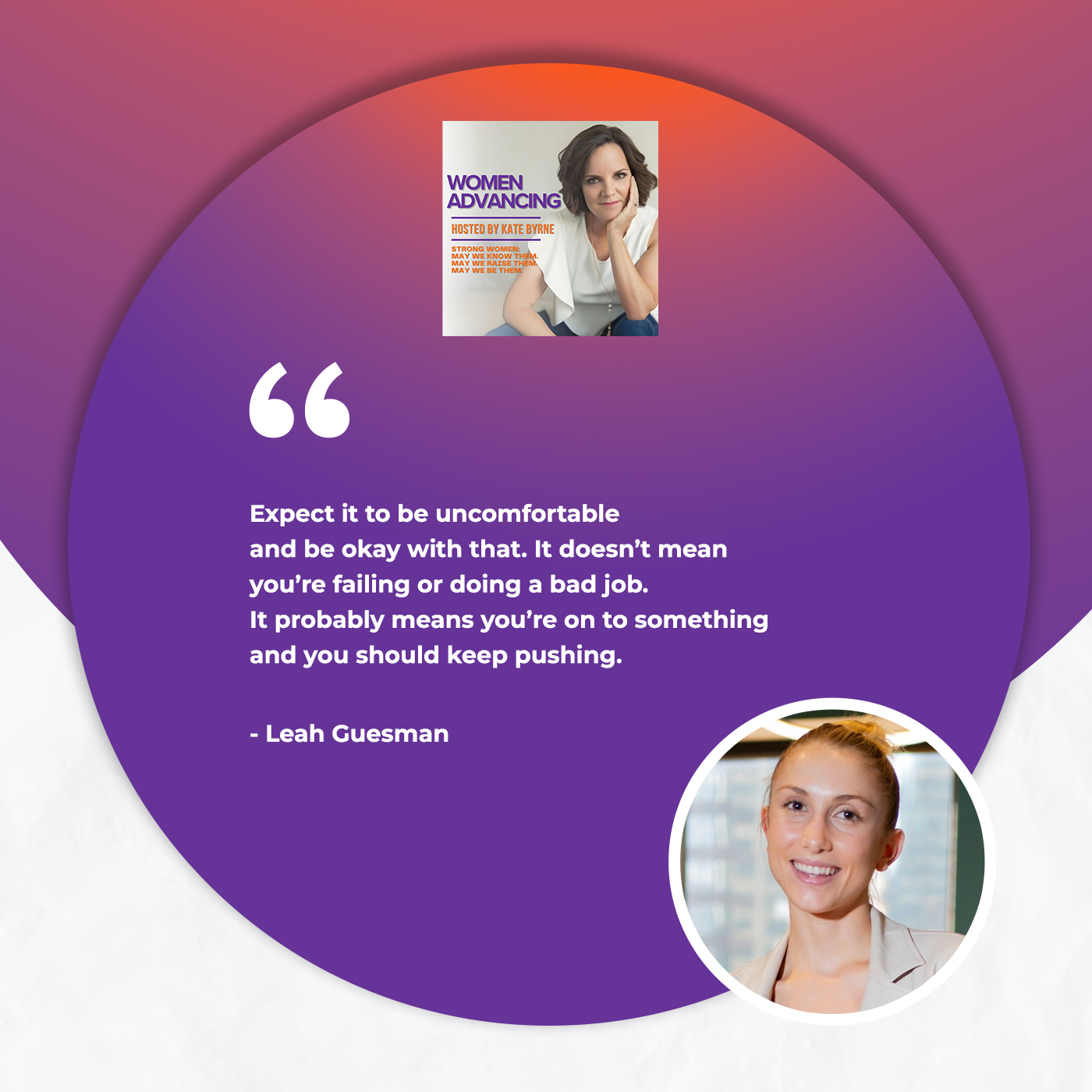
As Sophie said, it is like a marriage, and all those things play so well into being able to have really honest conversations, being able to get through periods where either the company’s not doing as well or your relationship isn’t doing as well, like having that durability. If you don’t tend to have friendships like that and you have trouble having those relationships, people, then working with someone who’s more at arm’s length and who your full business all the time, only business, maybe that does work better.
It depends. I also think Sophie and I have a unique situation where we’re not a technical and non-technical founder, and neither of us is a developer. I’ve seen co-founders where it’s just a super different relationship. Someone’s like off building 2,000 miles away, and someone else is doing everything else. It depends. I prefer our situation any day.
I think, too, it’s part of the reason why you’re probably able to be so honest with each other is because you care so much about this, the bigger idea. College Contact, all the families whose literally trajectories you’re changing. Not just for that one student, but literally their entire familial future. All of a sudden, there will be an example of what could be. Planting seeds and dreams that perhaps might historically not have been available to them which is important.
I think being aligned with values. If one of you is in it because you want to be famous or wealthy, and the other one is in it because you’re obsessed with the mission and the product, you’re going to if you’re working toward different goals, you’re not going to be successful. Sophie and I talk all the time. We’re like, even if College Contact imploded tomorrow, we would both move on feeling amazing about how many students we’ve helped. Our goal is always the students is always the mission piece for both of us all the way down. I think that’s important too, that you have the same goal.
Hardest Parts Of Building A Business
You made reference to it not always being puppies and unicorns, and cupcakes. There are some times when it’s tricky. In terms of scaling and stumbling, and staying sane, it’s never easy in general life, but it’s particularly hard when you’re running at the pace of your growing entities. That is what’s been the most unexpectedly hard part of building your business. What steps or what helped you navigate that?
A lot of things are hard. One of the trickier things is, as I said, Sophie and I are both committed to our mission, so figuring out how to make our mission scale and maintain the value and the core of what we’re doing as we get pulled in a lot of different directions. When you start working with schools, you’re getting pulled in the direction of compliance and district goals.
The admin their goals can sometimes take over and take away from a little bit, like four of what you’re trying to do for at the student level. There can be a lot of competing interests with that value and mission piece. What Sophie and I have had to become tactful and creative about is like, how do we band together and stay at the center with the value and the mission but think outside the box of what we’ve always done. Your first few years, you’re just throwing stuff off the wall, you’re trying everything, you’re doing things that don’t scale.
Now we’ve learned these four things that are super valuable. How do we take those and scale those and make them work for districts and administrators and make them work for parents and families and really be able to scale that? Having an open mind in those situations can be hard at first because it feels like you’re having things taken away from you, or it’s not possible. Learning to push through those, get creative, and keep thinking bigger. That’s a big challenge you have to keep going against.
Sophie, do you have anything to add?
I would just say that it’s very interesting. This goes back to your other point about the co-founder relationship. I think this is because our brains are very different. Hers is so good in the weeds. Mine is terrible at being in the weeds but great at being in the clouds. It naturally happens that we get stressed about different things at different times. Typically, when she’s stressed out, I’m totally happy, and I can calm her down because I see something else. When I’m stressed about the weeds, she’s pulling me out. It’s been great. That factors back into what we were saying earlier. Finding a partner is so crucial because when you go through these seasons where it can be tough, it’s very rare that we’re both at a low point, a low point now, which is great.
Navigating The Money Side Of Entrepreneurship
Which is terrific. I can imagine one of the things that stresses anyone, whether in the clouds or in the weeds, is money. The funding piece. Let’s talk a little bit about that. Share a little bit about your raise and what advice you would give to women who are navigating the money side of entrepreneurship. That’s one of the biggest stumbling blocks for many people. Like, “I don’t know how to raise money, or I don’t know, or I’m scared of budgets and Excel spreadsheets and such.” Share a little bit about that. Also, how did you get over it?
When managing finances as a startup business, you have to think 12 to 18 months in advance with the worst-case scenario in mind. Share on XI have a lot of points of advice here. My summer internship before I did this, again, remember I said I was in finance, I did an internship in growth equity. My role was to speak with CEOs, and I had to speak with thousands of them about them wanting to ask us for money. I learned the other side of it before I ever jumped in. I have tips from both sides. It’s just interesting to see the other end. I think one of the biggest things that is weird is that you want to see more on the eager side than the eager side.
With investors, and I tell this to a lot of folks, “Go in and just be a little bit more muted.” For some reason, psychologically, on the other side, they take that as “They’re doing well, they don’t need us.” This is interesting, you build that FOMO. Whereas on a client call, you’re very happy, cheerful, and excited, on investor calls. If you’re really asking for money and maybe not just networking, you are a little bit more relaxed, muted, and not overly excited.
With investors, and I tell this to a lot of folks, “Go in and just be a little bit more muted.” For some reason, psychologically, on the other side, they take that as “They’re doing well, they don’t need us.” This is interesting, you build that FOMO. Whereas on a client call, you’re very happy, cheerful, and excited, on investor calls. If you’re really asking for money and maybe not just networking, you are a little bit more relaxed, muted, and not overly excited.
The other thing is, and this helps me a lot, you should have a lot of conviction in what you’re doing. Even though raising money can be very validating, as it was for us, it was a little bit of a different situation because we were very young, and we had no jobs at that point. You want to think to yourself, because I have conviction, I also have somewhat of an autonomy to say no. Say no to an investor and giving that power back when you’re early on and you’re needing money helps you automatically create that tone. We said no to investors for our first round.
We’ve said no because they didn’t align with what we wanted for our company and didn’t align with our values. We put that hard line in the sand, and we figured it out, and we got more people to come in. Those are three big things. The last piece on the female founder piece. It is definitely more difficult, I would say, but Leah and I are pretty on board with. We never let it get in our heads. We just don’t even acknowledge it, obviously, which maybe it’s healthy, maybe it’s not, but we have young female founders come to us, and that’s the first question they ask.
I push back and I say, “That shouldn’t be your first question. Ask me how to do it and then think about that piece next.” Think about that piece next because you’ll get caught up in yourself, and if you go into it like “I’m a girl, they’re not going to listen.” It’s going to shut you down. It’s a psychological thing.
It is often so much the mental chatter that goes on inside our heads, and sometimes we’re our own worst enemies. I love the idea of going in just casual. Confidence is really attractive. That is magnetizing. They want to know what’s behind that. What do you wish more women knew about running the financial side of running a business like P&Ls? Again, I think so many people steer away from that. I would assume, Sophie, I know you obviously understand the financials, etc., but I would think, is this part of the nitty-gritty details?
Yeah. I do all of our financial modeling and all of our financial, I guess you could say maintenance or monitoring or whatever. I think my advice would be a few things. One, financial modeling itself can be overwhelming, and it can feel really scary. It’s not something that I would just try to do on your own and figure out. I would try to talk to somebody. There were a few amazing mentors that helped me start to get the gist of it when I was first building a model, but I did build my first models mostly on my own.
I wish I had someone to sit next to me and help me with it. If you can find someone like that, if you want me to do it with you, like happy, I’m sure Kate will have our contact info. Happy to hop on a call with you to talk about it because it would have saved me so much time and, quite frankly, so many tears. I’ve cried over multiple financial models. The first time I built the model and didn’t cry at all. I was extremely excited. That could be my vulnerable moment of this show. Having someone work with you on it and help you in the beginning would go so far and be so helpful.
My number one piece of advice from managing finances as a startup is to always be thinking 12 to 18 months in advance, and not thinking best-case scenario, think worst-case scenario. My models always have the ability for me to see what’s going to happen if Sophie and I make zero dollars. It’s easy to do that, but I always look at that because I want to have an understanding. I don’t blind site Sophie like, “We got 10K left, go get out there, champ. We need more money.”
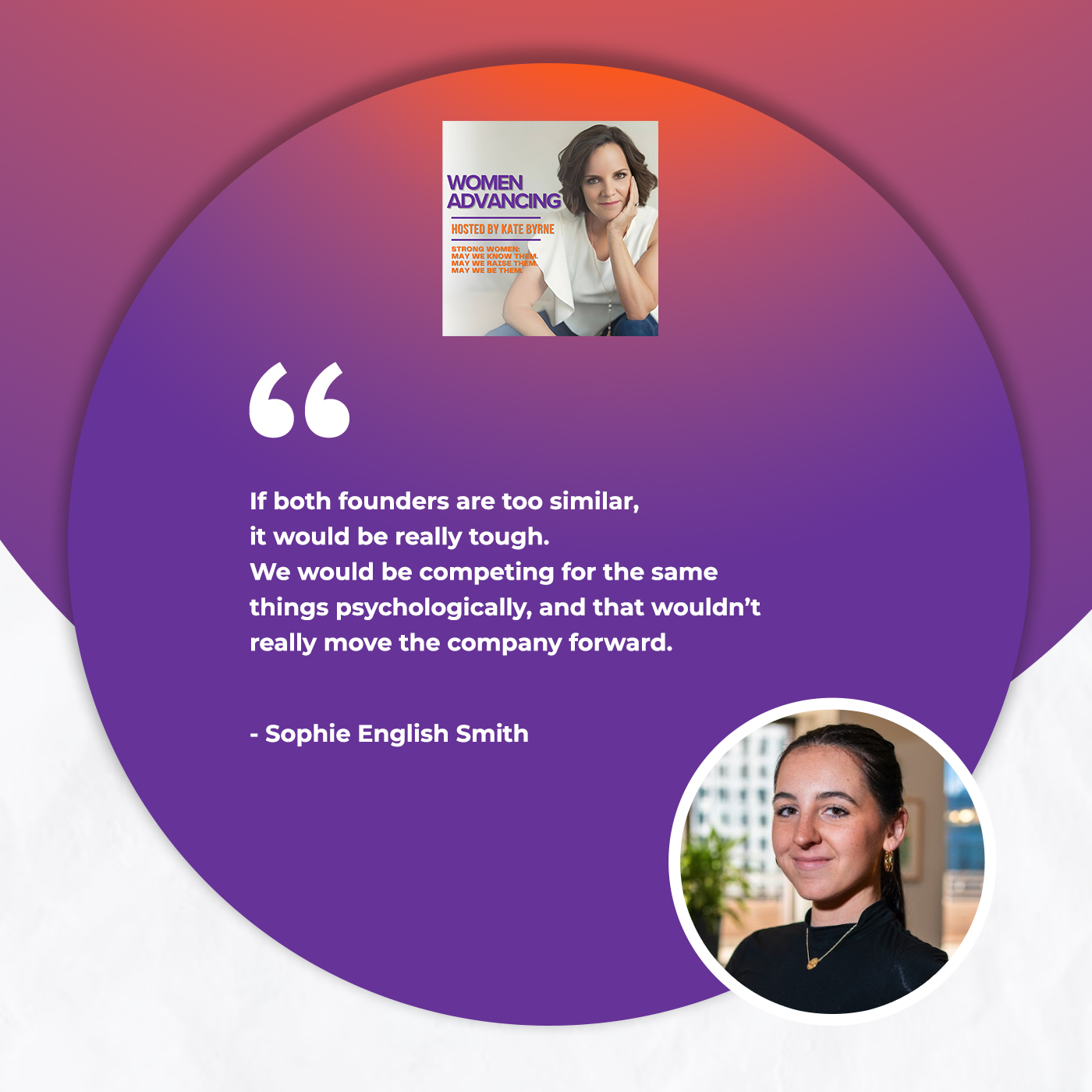
Budgeting in advance, thinking in advance, and then also being scrappy. Sophie and I are queens of that, sometimes to a fault. A lot of people and founders that I speak to who are coming from corporate backgrounds they spend money on weird stuff. They have way more things they’re paying for than I feel like what you need, especially at a very early-stage company. Being scrappy.
The last thing I would say is modeling sucks, but that is how you plan. That is how you figure out how you’re going to grow. If Sophie and I had been more adept at modeling earlier on, and you cannot fault us, we were just coming out of college, but it would have helped us get even more power out of our first million. Understanding that, like being able to build and model, is really how you’re going to be able to know when to put the gas down on spending money versus when to pull back and do all that budgeting in between.
Maybe we need another episode about this because I’m trying to find an insightful answer. Being able to model getting someone to help you in the beginning, always be thinking 12 to 18 months in advance, and consistently checking in and making sure there’s that line of communication from whoever’s managing the budget to who’s fundraising, so no one gets caught off guard.
Growth, Reinvention, and What’s Next For College Contract
There’s nothing worse than those surprises. I have done that myself. It’s true. I think you made that mistake once. You are an extraordinarily humble pie. Bon appetit, my friends. Once you do it, you’re like, “I’d rather be open and transparent than sit there and tell a story.” Shifting into growth and reinvention and such, you’re coming off this fabulous win. Again, congrats on the South by Southwest Award.
You got selected early for Techstars, which now you are living in Texas, etc. It sounds like you’re starting to think a little bigger because you’re realizing, “Wait, obviously there is a thing here. What’s next for College Contact?” That’s got you excited or maybe even a little nervous. We haven’t even talked about the impact of the current administration. I’m not sure I even really want to go there unless it’s a thing, unless you see it impacting you. I’d be curious. What’s the vision, and has it changed over time?
It’s evolved a lot. When we first started, it was essay writing, and then it moved to let’s just help you get into college, with fifteen college students helping. When we graduated, we realized we had about 30 people working as advisors and mentors. When we raised the million, we said, “The first part of this vision that we see is we want every student to have someone relatable to them to work with and relatable to their situation.”
It evolved into “Let’s go out and recruit and find a diverse network of people that want to come and help these students.” We have close to 400 mentors who are across the board. We have an incredibly diverse mentor network. They speak 30 different languages. Over half of them are people of color. Close to 40% of them are first gen. These students are incredible. We should bring some of them next time. Some of them were emancipated and got into Duke, UVA, and Harvard.
Some of them are first gen immigrant parents who only speak Spanish, and they made it to their top state school, and they’re studying aerospace engineering and biomedical engineering. They’re going to become the next doctors and NASA astronauts of the world. When we did that, that vision expanded, and now we were able to go into schools and say, “We have someone for everyone here. We’re someone relatable enough for this student to make their dream come alive earlier so that we can get them to that next step faster.”
They’re not wasting money in an area that maybe down the line, they’re like, “Never mind, let me reverse.” That was like the first move in the direction of where we are now. The second part of the vision was that we started realizing, to your point, that not everyone wants to go to college, and it’s not just the countries and just college-bound students. How do we expand our mission to be more equitable to those who don’t want to go to college?
More fair to the students who want to pursue other pathways. We retrained our mentor base, and we taught them about non-traditional pathways and what trade schools look like, and going directly to workforce entry. We included military pathways. Now, when we have a student come to us and they’re like, “I don’t know. I don’t think college is right for me.” We can talk to them about all these options.
Expecting discomfort makes it a lot easier to handle. Share on XA big push we have now, what we’re excited about, is the community college option we think is excellent. A lot of states and a lot of communities have made it completely free for their students. We’re big advocates for that because it saves a lot of money. It gives kids more time to decide, “Do I want to go to trade school?” It buys them that time. It allows them to have a little bit of a transition from start graduate at seventeen and go have fun. We’re big advocates for that.
As we expand, as you can see, the visions are expanding, and we definitely see us being able to expand vertically and horizontally into other areas. We’ve already gotten requests for, “Can you integrate careers in? Can you integrate like Greek life recruitment, social life? How do we navigate that financial literacy?” I don’t know. We’ll see. We have to be pretty focused on the current vision, but we’re very excited about the future.
Advice To Younger Selves
It’s amazing. It just makes me smile every time I read your newsletter and look at any of your amazing posts. In closing, what advice would each of you give your younger selves, knowing what you know now? Leah, do you want that one?
My dad just called me, and he was like, “I’m giving this talk about grit, and I just wanted to talk. I wanted to call you and ask how you feel like Mom and I raised gritty kids.” I was like, “Way to toot your own horn, but also thanks for calling me gritty.” The biggest thing I’ve learned from this whole experience is that expecting discomfort makes it a lot easier to handle. In the beginning, maybe like the first year you’re into this, I constantly just felt like something must be wrong with me or like I was failing.
Remember one time I fully broke down to Sophie during a financial modeling session? I was like, “I don’t understand. Everyone’s expecting me to be a project manager. I didn’t do computer science.” All of our investors are berating me about our model, and I didn’t study finance. I had all these different roles that I was trying to take on. It was like, “I’m not an expert at any of them.” It just totally made me feel helpless.
From that moment to now, I think what’s changed is that, like, it’s a hard job. It’s hard to do all those things. It’s hard to be a founder. If you can expect that discomfort and expect it to be difficult and be able to meet that difficulty with just like an eagerness to learn and grow and push through those moments, it gives you so much peace when you can just be like, “It’s okay that I’m uncomfortable. It’s okay that that didn’t go well. How can I learn from that?”
That has honestly made me feel a lot and also just be able to work a lot harder because I don’t constantly have that negative self-talk of not doing enough or I’m not good enough or whatever, or something must be wrong with me because something’s uncomfortable. Just expect it to be uncomfortable and be okay with that. I know it doesn’t mean you’re failing. It doesn’t mean you’re doing a bad job. It probably means you’re onto something, and you should just keep pushing and know that you can get through it, and practice being uncomfortable.
When you think about learning, you’re doing something new growth. Growth is uncomfortable. I mean, getting bigger because the other stuff doesn’t fit you anymore. You end up building this archive or library of past experience, where you say, “Wait a minute. I got through that.” It’s this notion of this too shall pass. “I got this. I’m not going to like it while I’m going through it, but I know that I’ll be able to get to the other side.” Terrific. Sophie, how about you?
I’m a big believer in everything happens for some reason. Whether that’s spiritual or not, I just do think that if you stumble, there’s a reason for that, like what Leah was saying. I think in college, when I was younger, my pathway wasn’t what I expected it to be, and I was a little bit nervous about that. Even now, in this role, if you hire someone, it doesn’t work out. You’re like, “We made a huge mistake. I’m opposite again.” I get anxious like, “We made an operational mistake or something.”
All these little things, or even if we don’t win a pitch competition, it’s incredible to see that was exactly what we needed to win the next one, or what we needed to find the right employee rate. I think that’s great advice for anyone is just things do not work out how they’re supposed to. We even tell our high schoolers that what their admissions decisions you end up being happier sometimes. Sometimes the school knows something we don’t, baby. You’re a big runner, and they don’t have a run club.
Exactly. Both of your comments remind me of there’s famous quote by Mother Teresa. She said, “I know God only gives us that which we’re ready for. I just wish she didn’t have so much faith in me.” It’s like, “God, I cannot do this no more.”
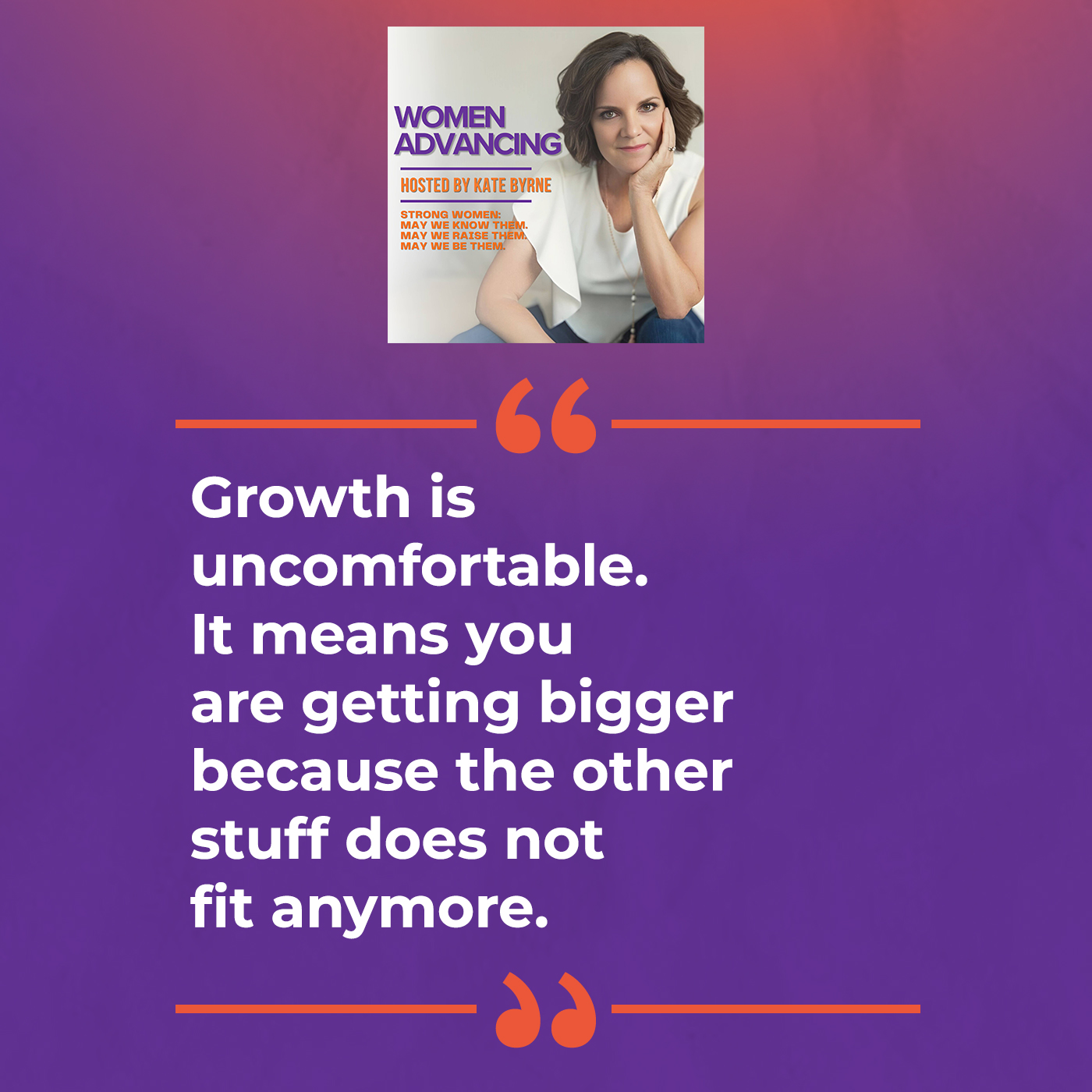
I love that.
Get In Touch With Sophie And Leah
It’s true. Just remember that. Just your little mother Teresa whispering in your ear for sure. Listen, you two, I really would love to have you come back and bring a couple of students. I think that’s a terrific idea. I’ll send a separate little note out separate about that, but I think that would be a terrific touch point. I think it would be great and great to have them and a great opportunity for them too. On behalf of the readers and of me, thank you so much. Thank you for what you’re doing to talk about an amazing set of role models. Where should people reach out to you? For a lot of folks who have kids who are entering that stage, where should they go?
They can find us on our website YourCollegeContact.com. I think Leah, you have the phone number. Maybe we give that.
It’s on our website.
Our Instagram is College Contact @CollegeContact. They can DM us there.
Our phone number is (857) 256-0283.
Everyone, readers, I’ll put that in the talking notes too, so you’ll have access and a hard copy too. Ladies, thank you. Here’s to having a great next few months ahead. Readers, get ready for part two.
Thank you. Great to be here.
—
KB’s Takeaways
That was probably one of the most honest and open conversations I’ve heard from two founders, and it reveals something that is true. I think there’s a new energy among female founders to really be open and share so that those coming up behind them can start with the leg up. For me, there were a few primary takeaways I enjoyed. First, be scrappy. This is not for the faint of heart. It is hard. Just be prepared for that.
As Leah said, when you get comfortable with discomfort, you find peace of mind, and you have this understanding that this too shall pass. When you are uncomfortable, that means something’s taking place. You’re learning, you’re growing, and it’s going to be something that you’re going to be able to put into action that’s going to help your entity grow. Second, know your numbers. Be comfortable with your numbers.
The reason why is this is the one spot, especially with most founders, particularly female founders, that investors always look at in terms of poking holes. Knowing numbers is very comforting and is a sign of confidence to investors. They’re going to be impressed and more apt to say, “They didn’t flinch when I asked them that.” As a result, think 12 to 18 months out, and always go for the worst-case scenario versus the best-case scenario. That seems like a simple duh thing to say. Many people don’t do that.
They get very much pie in the sky, and then what happens is you find yourself, when you look in the bank account, with only about a month’s left of revenue, and there goes your company belly up. With that, I’m going to thank you all for reading. We are definitely going to be having both Leah and Sophie come back. We’re going to have a couple of their students, and we’re going to do a couple of covering points on that, both from a branding standpoint, testimonials, and more. Be sure to tune in. Thanks again, and I look forward to seeing you at the next Women Advancing.
Important Links
- College Contact
- Sophie English Smith on LinkedIn
- Leah Guesman on LinkedIn
- 2025 South by Southwest EDU EdTech Award
- South by Southwest
- College Contact on Instagram
- College Contact on Facebook
About Sophie English Smith
 Sophie English Smith is the CEO and Co-Founder of College Contact, a nationally recognized EdTech platform transforming college and career advising. A 2023 graduate of the University of Virginia’s McIntire School of Commerce, Sophie majored in Marketing and IT with a focus in Data Analytics.
Sophie English Smith is the CEO and Co-Founder of College Contact, a nationally recognized EdTech platform transforming college and career advising. A 2023 graduate of the University of Virginia’s McIntire School of Commerce, Sophie majored in Marketing and IT with a focus in Data Analytics.
Her entrepreneurial journey began in her dorm room during the COVID-19 pandemic, when she launched College Contact to address gaps in accessible college counseling after a TikTok video went viral and thousands of students reached out for support.
Named Student Entrepreneur of the Year by the Charlottesville Business Innovation Council, she has also been featured in podcasts, books, and her “Young, Female, and CEO” LinkedIn newsletter. With over 60,000 TikTok followers, Sophie is affectionately known as the “CEO of College Essays,” having personally guided over 100 students through the college application process.
About Leah Guesman
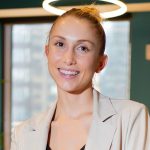 Leah Guesman is the Co-Founder and COO of College Contact, an innovative platform revolutionizing postsecondary advising. Originally from Los Altos, California, Leah graduated from the University of Virginia’s McIntire School of Commerce in 2023 with degrees in Marketing and Economics.
Leah Guesman is the Co-Founder and COO of College Contact, an innovative platform revolutionizing postsecondary advising. Originally from Los Altos, California, Leah graduated from the University of Virginia’s McIntire School of Commerce in 2023 with degrees in Marketing and Economics.
Passionate about education equity, Leah’s advocacy began in high school, where she served on a site council focused on improving student equity. She also tutored English language learners during the pandemic and was one of College Contact’s first mentors.
Leah joined Sophie Smith as a co-founder in 2023, combining her business expertise with her commitment to expanding access to college and career resources. She leads the development of partnerships with schools and nonprofits, enabling College Contact to reach thousands of students. Leah is driven by her mission to democratize college counseling and empower students from diverse backgrounds to achieve their postsecondary goals.
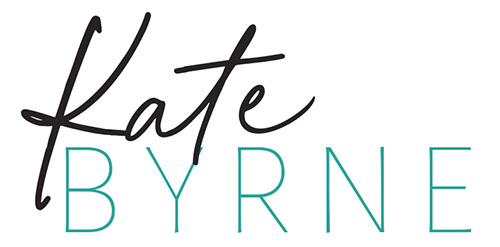
Awesome https://shorturl.at/2breu
Good https://shorturl.at/2breu
Very good https://shorturl.at/2breu
Awesome https://lc.cx/xjXBQT
Good https://lc.cx/xjXBQT
Very good https://lc.cx/xjXBQT
Very good https://short-url.org/10VGf
Very good https://t.ly/tndaA
Good https://t.ly/tndaA
Awesome https://urlr.me/zH3wE5
Very good https://is.gd/N1ikS2
Thanks so much Philip. It’s a great company!